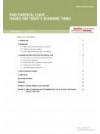The Families Commission released a research report and recommendations for improving paid parental leave in 2007 (Families Commission, 2007). Events since that time – particularly the global economic crisis and consequent recession – may have created an environment in which the improvements we sought are less of a priority.
Evidence however, indicates that not only could increasing paid parental leave improve outcomes for children, but it may also make good economic sense for New Zealand as well as for individual families.
In this paper we look at how other countries have adjusted their paid parental leave provisions in the current economic climate. The latest analysis from Australia suggests that investment in paid parental leave makes sense during an economic downturn as an efficient means to stimulate local economies. Other writers also suggest that paid parental leave will pay for itself over the course of a woman’s working life where increased workforce participation results. Improving the flexibility of provisions to enable those outside the current scheme to use them is also part of future-proofing the New Zealand labour market.
Evidence shows that families and whānau are most economically vulnerable when new children arrive. Financial pressure is frequently mentioned as a key reason for returning to work, in some cases, earlier than desired by some parents (Department of Labour, 2007). Recessionary pressures on family budgets may further increase the significance of financial factors in parents’ decisions to return to work. Paid parental leave takes the financial pressure off at the most vulnerable time, which can prevent debt (which our evidence shows is most acute with families with dependent children).
Parents, and initially mothers, can be faced with balancing their attachment to their workplace with developing a secure attachment with their babies. Returning to work is important in ensuring families’ economic wellbeing, but equally, time off work to allow bonding during the early months following the birth of a child has long-term benefits to children and society.
New Zealand is experiencing increasing diversity in its population, family arrangements and work arrangements. In this context, families themselves are best placed to make decisions about balancing workplace attachment and creating optimal attachment in their children. To make the best decisions for themselves and society requires families to have access to paid parental leave provisions that provide a real choice about who will be the main caregiver and when they return to work.
Helping parents to minimise or reduce any financial stress and smoothing the transition in and out of paid work around the birth or adoption of a child makes sense. Investing in parental leave supports parents in this time of transition and protects against longer-term costs arising from insecure parent-child attachments and poorer labour market and economic outcomes for mothers and their families.

